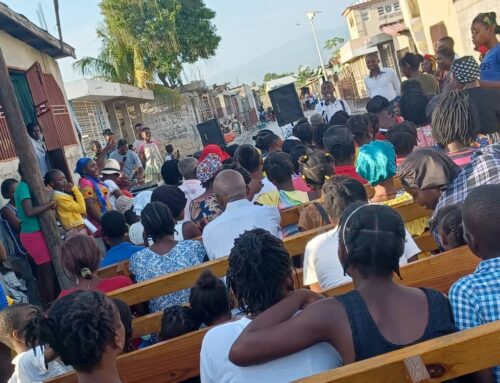Port-Au-Prince, Haiti (CNN) — Fires burned in several spots in Haiti’s capital Wednesday morning, where angry demonstrators were voicing their dismay at the announcement the night before that Jude Celestin, a protégé of current President Rene Preval, had won enough votes to enter a runoff in January.
“Preval is a thief. We don’t need Jude Celestin. We need Michel Martelly,” people chanted, expressing support for the candidate who came in third and was left out of the runoff.
Many streets in Port-Au-Prince were strewn with rocks thrown by protesters, who hurled them with a purpose: to disrupt the capital.
Journalist Ernest Moloskot predicted that more violence awaited Haiti in the days ahead.
“It will get worse because of the anger of the people,” he said.
American Airlines canceled all flights to and from Haiti on Wednesday amid the unrest there, a spokeswoman said.
Many people kept to their homes Wednesday, fearful of the brewing tension outside and fearful of what the future may bring in their already troubled homeland.
Most vocal on the volatile streets were the supporters of Martelly, a flamboyant Haitian entertainer otherwise known as Sweet Mickey.
It had been widely expected that the unlikely candidate would face former first lady and parliamentarian Mirlande Manigat in a runoff.
Martelly had expressed confidence that his status as a political novice would be his very strength and that he would emerge victorious onto Haiti’s political stage.
Even the night before the results were announced by the Provisional Electoral Council, Martelly, dressed in a suit and a wide smile, gave countless media interviews from a room at the swanky Karibe Hotel.
He cautioned then that the results would betray the will of the people.
So when the numbers were finally read out late Tuesday, Martelly immediately vowed to appeal. He had planned a news conference to discuss his challenge, but was forced to cancel it when Port-Au-Prince exploded with the kind of street unrest that so many here had seen coming.
The Provisional Electoral Council said Manigat had won 31.37 of the vote. Celestin edged out Martelly 22.48 percent to 21.84 percent.
Since no candidate obtained the 50 percent of the votes needed to win outright, Haitians will return to the polls in January, four days after the first anniversary of the devastating earthquake, to vote in a runoff election.
But even before Martelly charged fraud Tuesday evening, the entire electoral process had come into question.
The National Observation Council (CNO), a European Union-backed local election monitoring group, suggested Celestin was running behind the other two candidates.
Martelly said aloud what many others in Haiti were thinking: Preval would go to any lengths to ensure a win for Celestin and preserve the power of his party, INITE.
“The math says an absolute fraud,” said his campaign manager, Damian Merlo.
Some people here were buoyed by a statement from the U.S. Embassy issued late Tuesday that said the United States supports the review of irregularities in the vote so that results are “consistent with the will of the Haitian people expressed in their votes.
“Like others, the government of the United States is concerned by the Provisional Electoral Council’s announcement of preliminary results from the November 28 national elections that are inconsistent with the published results of the National Election Observation Council (CNO), which had more than 5,500 observers and observed the vote count in 1,600 voting centers nationwide,” the embassy said.
Even as that statement was being issued, gunfire rang out on the streets and the acrid smell of burning tires and other objects filled the air.
People ran out on the streets denouncing Celestin. In the central Champs de Mars plaza, white pickup trucks carrying police in the back made their way around littered streets.
Residents of a tent city that covers the entire plaza beat on the rows of portable toilets, knocking one down.
Some of the worst rioting took place in the more upscale neighborhood of Petionville, known to be a Martelly stronghold. Roads were blocked and buildings were set afire. At 2 a.m., police were dodging fires and going door-to-door searching for vandals.
It had been feared that a win or runoff spot for Celestin would trigger more unrest in the Haitian capital. Preval’s government has become increasingly unpopular with Haitians who see a lack of progress in their homeland.
Preval was barred by the constitution from seeking another term. Celestin headed the state-run transportation company that gained notoriety in the days after the quake as its trucks picked up the bodies of the dead and were tasked with clearing the rubble.
The next president of Haiti will inherit the daunting task of leading this Caribbean nation in its struggle to recover from years of dictatorship and poverty compounded earlier this year by the earthquake, Hurricane Tomas and a current cholera epidemic that has now sickened almost 100,000 people.
“We cannot take it anymore,” Moloskot said.
CNN’s Devon Sayers contributed to this report




